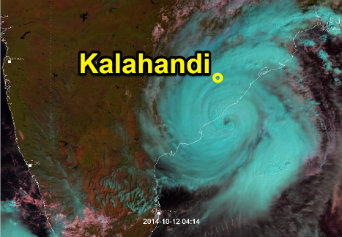As Cyclone Hudhud churned toward India’s southeastern coastline earlier this month, about 200 Christians in the path of the storm gathered to pray for safety.
Twenty-five of them were hospitalized, three of them with serious injuries — not because of the cyclone, but because of a violent mob that accused the group of turning Hindus into Christians.
The prayer group had assembled on Oct. 10 in Kalahandi in the state of Odhisa, about 300 kilometres north of the spot where Hudhud would make landfall in the early hours of Oct. 12. They planned three days of meetings and prayer.

At about 7 p.m. on Oct. 11, just hours before the cyclone slammed into Visakhapatnam in the coastal state of Andhra Pradesh with winds topping 215 kph, a group of about 50 burst into the meeting.
“The attackers angrily shouted that 100 people were converted into Christianity and started to beat, push, kick and slap us,” said Rabindra Nath Tandi, a local pastor and one of the organizers of the prayer meeting.
During the 30-minute assault, the lights went off and people ran in different directions in the dark. Power was restored after police arrived, Tandi said.
Three of the Christians received serious injuries. Dilip Durga sustained injuries in his neck and chest; Udal Padan was severely cut on his leg and chest; and a woman named Soilengri suffered a head injury when she fell trying to flee. The other 22 sustained bruises and abrasions. All had been released from the area government hospital after two days.
The attackers are believed to be members of Rashtriya Swayamsevak Sangh, a right-wing Hindu organization frequently accused of violence by Christian advocacy groups.
“The incident seems to be well planned as prior to the attack,” Tandi said. “About five extremists turned up at the hall, inquired what the meeting was about, who attended the meeting, and later a large mob turned up to beat us.”
The meeting was attended by about 200 people from 20 villages who had recently converted to Christianity. It was called to pray for protection from the cyclone, said Mohan Dass, one of the main speakers.
“It is sad that people who willingly come to the meeting for their own personal needs were scattered by the violent mob, and this is against the freedom of conscience guaranteed by the constitution of India,” he said.
The planned third day of the meeting was cancelled after police advised church leaders not to continue the meeting for safety reasons.
The intruders filed a police complaint against the Christians alleging forceful conversion, which is illegal in India. The Christian group filed its own complaint, reported the religious-rights group Alliance Defending Freedom, India.
Andhra Pradesh is one of eight Indian states that have some form of law restricting religious conversion. Anti-conversion laws typically forbid recruitment, and sometimes require citizens to alert the local government that they intend to convert. Though they are portrayed as protection against coercion, human-rights advocates say the laws frequently are used as a tool to suppress the activities of religious minorities, including Christians.
India’s collection of anti-conversion laws are a big reason why the country is No. 28 on the 2014 World Watch List, an annual ranking of the 50 countries where life for Christians is most difficult. The list is updated annually by Open Doors International, a charity that provides support to Christians who live under pressure because of their faith.
“No person should face violence and hostility because of their religious beliefs,” said Tehmina Arora of the ADF. “The constitution of India gives each person the right to practice, profess and propagate the religion of one’s choice and the freedom of association. Such incidents are glaring examples of the growing intolerance faced by religious minorities at the hands of non-state actors.”